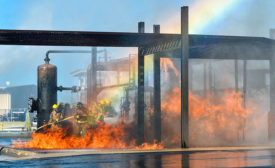Featured on Home Page
Selection, care & use of FR garments
NFPA 2113 standard spells it out for you
January 18, 2019
Compressed air can be lethal
Workplace injuries, often created by misuse, can be devastating
January 17, 2019
Report problems & precursors early & often
Hey, you — keep that door open!
January 16, 2019
Become a Leader in Safety Culture
Build your knowledge with ISHN, covering key safety, health and industrial hygiene news, products, and trends.
JOIN TODAYCopyright ©2025. All Rights Reserved BNP Media.
Design, CMS, Hosting & Web Development :: ePublishing









